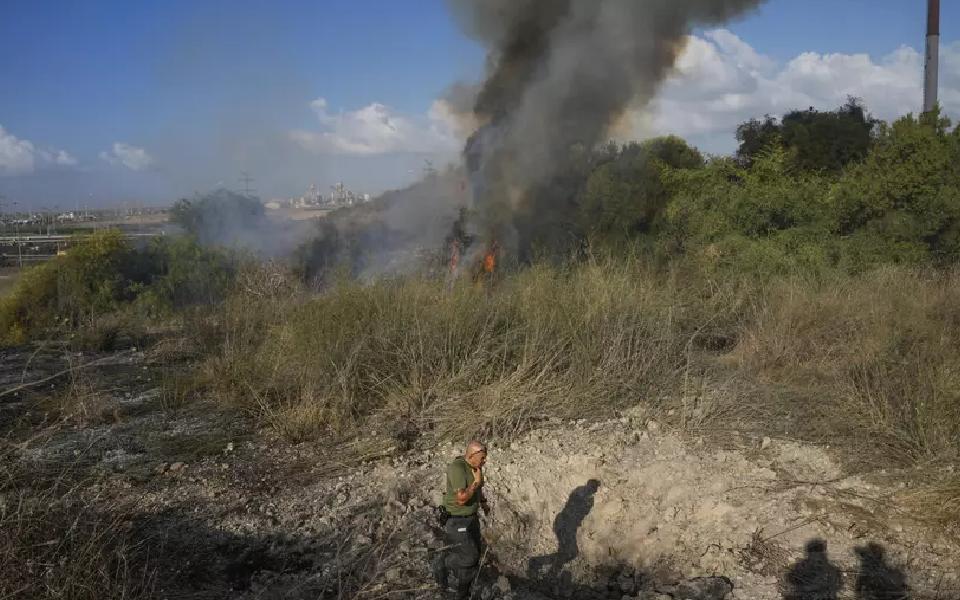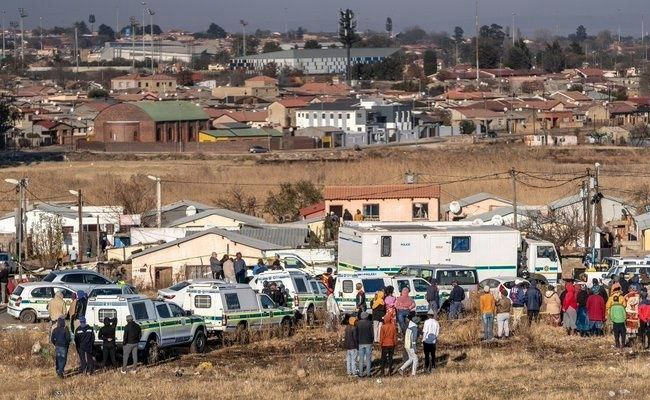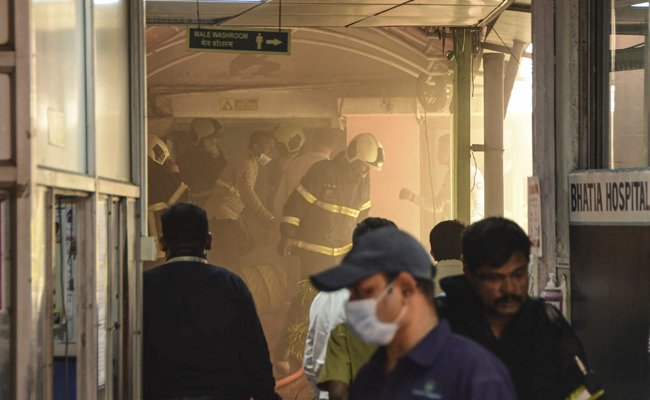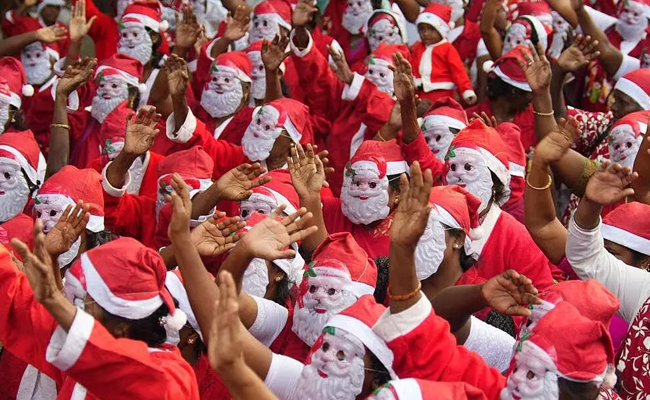Jeusalem, Sep 15: A missile fired from Yemen landed in an open area in central Israel early Sunday, the Israeli military said, in the latest reverberation from the nearly yearlong war in Gaza.
The early morning attack triggered air raid sirens, including at Israel's international airport, where local media aired footage of people racing to shelters. There were no reports of casualties or damage, and the airport authority said operations resumed as normal shortly thereafter.
A fire could be seen in a rural area of central Israel, and local media showed images of what appeared to be a fragment from a missile or interceptor that landed on an escalator in a train station in the central town of Modiin. The military said the sound of explosions in the area came from interceptors.
Yemen's Iran-backed Houthi rebels have repeatedly fired drones and missiles toward Israel since the start of the war in Gaza between Israel and the Palestinian group Hamas, but nearly all of them have been intercepted over the Red Sea.
The Houthis did not claim Sunday's attack directly, but rebel officials appeared to boast about it.
Hashim Sharaf al-Din, a spokesperson for the Houthi-run government, said Yemenis will celebrate the birthday of Islam's Prophet Muhammad while “the Israelis will have to be in shelters.” Another senior Houthi official, Hezam al-Asad, posted a taunting message in Hebrew on the social platform X.
In July, an Iranian-made drone launched by the Houthis struck Tel Aviv, killing one person and wounding 10 others. Israel responded with a wave of airstrikes on Houthi-held areas of Yemen.
The Houthis have also repeatedly attacked commercial shipping in the Red Sea, in what the rebels portray as a blockade on Israel in support of the Palestinians. Most of the targeted ships have no connection to Israel.
The war in Gaza, which began with Hamas' October 7 attack into southern Israel, has rippled across the region, with Iran and allied groups attacking Israeli and US targets and drawing retaliatory strikes from Israel and its Western allies. On several occasions, the strikes and counterstrikes have threatened to trigger a wider conflict.
International carriers have cancelled fights into and out of Israel on a number of occasions since the start of the war, adding to the war's economic toll on the country.
Iran supports many groups across the region, including Hamas, the Houthis and Lebanon's Hezbollah, its most powerful ally, which has traded fired with Israel on a near-daily basis since the war in Gaza began. Iran and its allies say they are acting in solidarity with the Palestinians.
The military said around 40 projectiles were fired from Lebanon early Sunday, with most intercepted or falling in open areas.
The strikes along the Israel-Lebanon border have displaced tens of thousands of people on both sides. Israel has repeatedly threatened to launch a wider military operation against Hezbollah to ensure its citizens can return to their homes.
Hezbollah has said it would halt its attacks if there is a cease-fire in Gaza. The United States and Arab mediators Egypt and Qatar have spent much of this year trying to broker a truce and the release of scores of hostages held by Hamas, but the talks have repeatedly bogged down.
In recent weeks, Prime Minister Benjamin Netanyahu has insisted on lasting Israeli control over the Gaza side of the border with Egypt, which Israeli forces captured in May. He has said Hamas used a network of tunnels beneath the border to import arms, allegations denied by Egypt, which along with Hamas is opposed to any lasting Israeli presence there.
An Israeli military official said late Saturday that of the dozens of tunnels discovered along the border, only nine entered Egypt, and all were found to have been sealed off. The official, who spoke on condition of anonymity to discuss sensitive intelligence, said it was not clear when the tunnels were sealed.
The discovery appeared to weaken Netanyahu's argument that Israel needs to keep open-ended control of the corridor to prevent cross-border smuggling.
Egypt has said it sealed off the tunnels on its side of the border years ago, in part by creating its own military buffer zone along the frontier.
Let the Truth be known. If you read VB and like VB, please be a VB Supporter and Help us deliver the Truth to one and all.
Johannesburg (AP): A 32-year-old suspect has been arrested in connection with a mass shooting which claimed the lives of 12 people including three children at an unlicensed pub earlier this month, South African police said on Monday.
The man is suspected of being one of the three people who opened fire on patrons in a pub at Saulsville township, west of South Africa's capital Pretoria, killing 12 people including three children aged 3, 12 and 16.
At least 13 people were also injured during the attack, whose motive remains unknown.
According to the police, the suspect was arrested on Sunday while traveling to Botlokwa in Limpopo province, more than 340 km from where the mass shooting took place on Dec 6.
An unlicensed firearm believed to have been used during the attack was recovered from the suspect's vehicle.
“The 32-year-old suspect was intercepted by Limpopo Tracking Team on the R101 Road in Westenburg precinct. During the arrest, the team recovered an unlicensed firearm, a hand gun, believed to have been used in the commission of the multiple murders. The firearm will be taken to the Forensic Science Laboratory for ballistic analysis,” police said in statement.
The suspect was arrested on the same day that another mass shooting at a pub took place in the Bekkersdal township, west of Johannesburg, in which nine people were killed and 10 wounded when unknown gunmen opened fire on patrons.
Police have since launched a search for the suspects.
South Africa has one of the highest homicide rates in the world and recorded more than 26,000 homicides in 2024 — an average of more than 70 a day. Firearms are by far the leading cause of death in homicides.
The country of 62 million people has relatively strict gun ownership laws, but many killings are committed with illegal guns, according to authorities.
According to police, mass shootings at unlicensed bars are becoming a serious problem. Police shut down more than 11,000 illegal taverns between April and September this year and arrested more than 18,000 people for involvement in illegal liquor sales.





